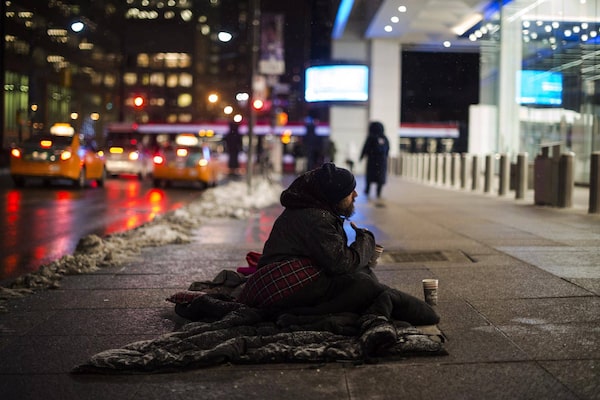
A homeless person in downtown Toronto on January 3, 2018.Christopher Katsarov/The Canadian Press
A downtown armoury opened to Toronto's homeless on Saturday evening as the city faced a 13th day with an extreme cold-weather alert in effect.
The Moss Park Armoury had not been expected to open until Monday. However, after federal Public Safety Minister Ralph Goodale announced on Friday that the armoury would be opened as a temporary homeless shelter following a request from the city, staff began retrofitting it.
The facility will provide 100 cots and is situated on the eastern edge of the downtown core, close to a supervised-drug-use site.
"We are dedicated to meeting the needs of our city's most vulnerable," Mayor John Tory said. "I want to extend my sincere appreciation to city staff for this extraordinary response to address this urgent situation."
Mr. Tory called the cold conditions "relentless" and said the increased demand for additional homelessness supports is "unprecedented."
When fully operational, services at the Moss Park Armoury will include access to meals, showers, hygiene kits and referrals to additional supports such as case management and housing supports.
The opening of the armoury comes as Toronto's hospitals and outreach teams have been seeing a spike in frostbite cases since the city's recent cold snap began.
As of Friday, staff at St. Michael's Hospital had seen six cases of frostbite since Boxing Day, when normally they don't see any at this time of year, said Dr. Glen Bandiera, chief of emergency medicine at the hospital.
"It is unusual to see this number of cases at this time of year," Dr. Bandiera said. "It's directly related to the depth and duration of the temperatures here."
Jennifer Evans, who has been co-ordinating a citizen-run project to put up the homeless in hotel rooms, has seen several cases of frostbite when encountering people on the street. One woman, she said, had a bad case of frostbite on her feet, to the point that she will likely have to spend weeks out of the cold to heal. She is now staying in one of the hotel rooms funded through this project.
"I was just horrified," Ms. Evans said. "It's really devastating to see the effects that winter can have. Even though we're Canadian, we forget how debilitating the conditions can be in the winter."
But Dr. Joshua Tepper and his staff have made a point of not forgetting how harmful winter can be, especially for the vulnerable. Dr. Tepper runs a clinic through Inner City Health Associates that services primarily homeless or precariously housed patients. He said his staff are being "more attentive" to frostbite cases, checking patients' extremities and exposed areas for frostbite since the cold snap.
"Any exposed area or poorly covered area is a real risk," Dr. Tepper said. "That could include cheeks, ears, fingers, nose," not just toes.
To treat frostbite, Dr. Tepper said the area needs to be slowly warmed up after removing any cold or wet clothing. Rubbing the frostbitten area or placing it near a heat source can be dangerous as there will be little sensation, so it could easily be damaged further without the person's knowledge.
"It is ultimately preventable," said Dr. Tepper, whose clinic is handing out bundles of dry socks to give to those in need. "We should recognize this not as an inevitable outcome, but as something we can take steps to prevent in our community."
In addition to the armoury, the city has also increased the capacity at the Better Living Centre at Exhibition Place to 200 cots and added an additional 80 cots at a community centre. It has also added an overnight shift for at least four street outreach teams during extreme cold-weather alerts. These changes come as Toronto's forecast is expected to improve, with temperatures set to break past the freezing point later in the week.
With files from Rachel Levy-McLaughlin